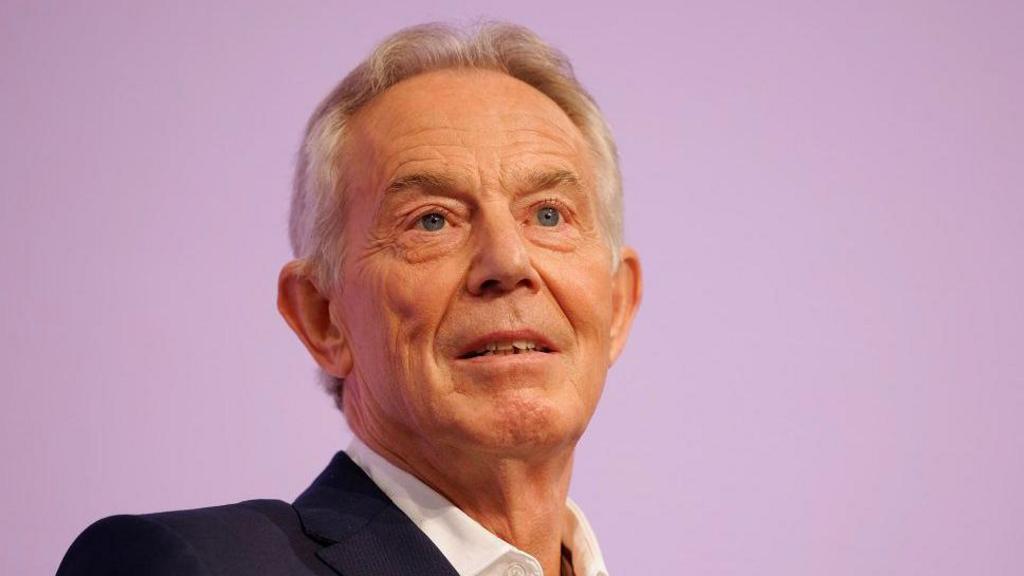The government has reiterated its commitment to net-zero objectives following Sir Tony Blair’s assertion that efforts to curb fossil fuel use are “doomed to fail,” calling for a fresh course of action.
The former Labour prime minister argued that discussions on climate change have become “irrational,” with citizens of affluent nations reluctant to accept personal financial cost “when they see their contribution to global emissions as negligible.”
Opposition groups have interpreted Blair’s remarks as criticism of Sir Keir Starmer’s pledge to achieve net zero greenhouse gas emissions in the UK by 2050.
Responding during Prime Minister’s Questions, Sir Keir stated: “If you examine the details of Tony Blair’s comments, he is entirely in agreement with our current strategy.”
Labour officials have maintained that the pursuit of net zero will involve no significant economic sacrifices and will have limited impact on daily life.
Moments before the session, the Tony Blair Institute (TBI) released a statement supporting the government’s 2050 net zero goal, describing the UK’s approach as “the right one.”
Asked if the institute was prompted by the government to clarify its stance amid rising political tensions, the prime minister’s spokesperson declined to comment on private discussions.
Sir Keir’s spokesperson further affirmed the prime minister’s confidence in Energy Secretary Ed Miliband, noting he is “doing an excellent job.”
However, he disagreed with Sir Tony’s assessment of “hysteria” dominating the climate debate.
He told journalists: “I don’t think that is the case; our approach remains practical and pragmatic within the UK context.”
He added: “Our net zero policy is straightforward. It is British households who will ultimately shoulder the burden of reliance on fossil fuel markets.”
Nicholas Stern, author of a landmark review of climate economics commissioned by Blair in 2006, described the latest TBI report as “confused and misleading.”
Stern argued that it undervalued global progress towards decarbonisation and did not recognise the UK’s pioneering leadership.
“Should the UK falter in its net zero trajectory, this could weaken international resolve. The UK’s role remains significant,” said Professor Stern, chair of the LSE Grantham Research Institute on Climate Change.
The TBI’s findings point to predicted increases in fossil fuel use and a doubling of air travel worldwide over the next two decades as challenges to present climate efforts.
“These are the difficult realities, making any strategy reliant on quickly ‘phasing out’ fossil fuels or reducing consumption unviable,” Blair wrote in the report’s foreword.
The document recommends retaining existing carbon targets for business consistency, while urging a fundamental reassessment of achievement methods.
It advocates prioritising advancements in technologies like carbon capture and nuclear fusion, alongside renewed global engagement to encourage emission reductions from leading economies such as China and India.
To reach the 2050 goal, both Labour and the preceding Conservative government committed to initiatives such as providing “clean” electricity, banning new petrol and diesel cars by 2030, and installing 600,000 electric heat pumps annually by 2028.
Conservative leader Kemi Badenoch has recently withdrawn her party’s endorsement of the 2050 net zero target.
Shadow Environment Secretary Victoria Atkins acknowledged broad agreement on environmental protection but emphasised the necessity of public support for proposed measures.
She added that Blair’s intervention sent a “clear signal” for the government to reconsider its net zero strategy.
Amid fractious internal debate within Labour, a government source suggested that TBI’s views might have been influenced by funding from oil-rich Saudi Arabia, a claim TBI rejects.
The Tony Blair Institute insists it maintains “editorial independence.”
Labour’s relationship with Tony Blair and his political legacy has remained complex since his departure in 2007.
Ed Miliband’s 2010 leadership win over his brother David, as well as Jeremy Corbyn’s subsequent tenure, were viewed by many as a departure from Blair’s policies.
However, since Sir Keir Starmer became leader in 2020, he has often referenced and worked closely with Blair’s most successful Downing Street allies.
Jonathan Powell, Blair’s former chief of staff, now serves as Starmer’s national security adviser, while former deputy chief Liz Lloyd has returned as director of policy delivery.
Lord Mandelson, one of Blair’s strongest political allies and a former cabinet member, is currently the UK’s ambassador in Washington.
This comes as the independent Climate Change Committee delivers a critical report, stating that Labour has made minimal headway in improving UK resilience to rising temperatures since assuming office.
Subscribe to our Politics Essential newsletter for comprehensive updates from Westminster and beyond.
More than 20 locations could receive new charging points under Kirklees Council’s summer plans.
Devon Partnership NHS Trust reports that upcoming projects will free up resources for patient care.
Herefordshire Council estimates that almost one in five local households face fuel poverty.
The Devon site features multiple sustainability measures, including bedside lamps crafted from recycled plastic.
A proposal from local villagers aims to install 424 solar panels on an unused orchard.

